Incontinence in Children with Special Needs
Posted by Paige Wooding on Aug 28th 2024

This article aims to provide valuable information and support for families dealing with incontinence in children with special needs. We understand the unique challenges that these children and their families face, and we are here to help. In this article, we will explore various aspects of incontinence in children with special needs, including understanding the condition, managing it effectively, and providing the necessary support.
Understanding Incontinence in Children with Special Needs
Incontinence is a common issue that affects many children with special needs. Understanding the causes and impact of incontinence is crucial for parents and caregivers to provide the best care and support for these children.
Various factors can contribute to incontinence in children with special needs. Physical disabilities, such as muscle weakness or impaired mobility, can affect their ability to control their bladder and bowel movements. Neurological conditions, like cerebral palsy or spina bifida, can also disrupt the normal functioning of the urinary and digestive systems, leading to incontinence.
The impact of incontinence on a child's daily life and emotional well-being should not be underestimated. It can cause embarrassment, low self-esteem, and social isolation. Children may feel ashamed or different from their peers, which can affect their overall emotional health. Additionally, managing incontinence requires constant attention and care, which can be physically and emotionally draining for both the child and their caregivers.
Recognizing the signs and symptoms of incontinence in children with special needs is essential for early intervention and effective management. These may include frequent urination, bedwetting, difficulty controlling bowel movements, or sudden and uncontrollable urges to go to the bathroom. It is important to note that every child is unique, and the symptoms may vary depending on their specific condition.
Our range of products is designed to provide comfort, protection, and dignity for these children. From absorbent special needs diapers and pull-ups to waterproof bedding and skincare essentials, we offer special supplies that can help manage incontinence and improve the quality of life for both the child and their caregivers.
Managing Incontinence in Children with Special Needs
Managing and treating incontinence in children with special needs can present unique challenges. However, with effective strategies and the right incontinence products and supplies, it is possible to provide the necessary care and support for these children.
When it comes to managing incontinence in children with special needs, it is important to develop a personalized care plan that addresses the specific needs of each child. This may involve working closely with healthcare professionals, caregivers, and educators to understand the child's condition and create a comprehensive plan.
- Routine: One effective strategy for managing incontinence in children with special needs is establishing a consistent bathroom routine. This includes scheduled bathroom breaks, regular toileting reminders, and creating a comfortable and accessible bathroom environment. By establishing a routine, children can develop a sense of predictability and control, which can help manage their incontinence.
- Incontinence Products: Choosing the right incontinence products and supplies is also crucial. For children with special needs, it is important to consider their individual requirements and sensitivities. There are various options available, such as special needs diapers, protective underwear, bed pads, and skincare products. It is essential to select products that offer comfort, absorbency, and promote skin health.
- Compassion: When managing incontinence in children with special needs, it is crucial to approach it with compassion, patience, and understanding. By developing a personalized care plan and using the right incontinence products, we can help these children lead a comfortable and confident life.
- Education: Educating caregivers, teachers, and peers about incontinence in children with special needs is essential to ensure a supportive community. By equipping everyone with the knowledge they need, we can create inclusive learning environments where children feel supported and accepted, friendships with peers without embarrassment, and quality care from those around the child.
- Open Communication: Empowering children with special needs to manage their own incontinence is a key aspect of our approach. By involving children in the decision-making process and providing them with the tools they need, we empower them to take control of their own care. This not only enhances their self-esteem but also promotes their overall well-being.
Resources and Assistance for Families
When caring for a child with special needs, it's important to have access to helpful resources, organizations, and support groups. These can provide valuable information, guidance, and emotional support for families navigating the challenges of incontinence in children with special needs.
Finding these resources is crucial, and there are several ways to go about it. Start by reaching out to local hospitals, clinics, and pediatricians who may be able to recommend specific organizations or support groups in your area. They may also have information on events or workshops that can provide further education and support.
Online resources are also readily available. Explore websites and forums dedicated to special needs parenting and/or incontinence, such as MyCareSupplies.com, where you can find articles discussing incontinence. These platforms often offer a wealth of information and the opportunity to connect with other families going through similar experiences.
Remember, you are not alone in this journey. By utilizing the resources and assistance available, you can provide the best possible care for your child with special needs.

